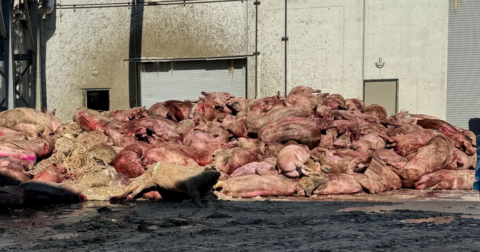Fact Check
Fact-Checking Claims Made About Oklahoma’s Lawsuit Against Tyson Foods
Food•5 min read
News
A decade later, the pork plant became the subject of a scathing complaint to the EPA about working conditions.


Words by Nina B. Elkadi
In 2015, to get pork processing facility Seaboard Triumph Foods off the ground, the Iowa Economic Development Authority awarded the corporation millions of dollars. The subsidies, amounting to $16,443,002 in 2015 alone, were meant for industrial job growth and training. But in the decade that followed, Seaboard Triumph Foods came to be at the center of multiple Department of Labor code violations, as well as allegations from a former employee, who described piles of dead pigs and noxious gases wafting inside the plant. In April 2025, the former employee shared his work safety and environmental concerns with the Environmental Protection Agency.
On paper, the jobs seem as good or even better than opportunities elsewhere in the state, with attractive wages and benefits. But the actual conditions for the workers are a very different story.
According to their website, the Iowa High Quality Jobs Program “provides qualifying businesses assistance to offset some of the costs incurred to locate, expand or modernize an Iowa facility,” through loans, tax credits, exemptions and refunds. The state defines a “High Quality Job” as one which meets certain wage and benefit requirements.
Seaboard Triumph was given $16,443,002 in tax credits for creating approximately 1,000 jobs. The Targeted Jobs Withholding Tax Credit diverts state income taxes from employees’ paychecks, which usually go to the state, back to the company.
The other approximately $8,365,479 million was awarded to Seaboard Triumph Foods in the form of training reimbursement credits. In 2015, 2017 and 2018, the Iowa Economic Development Authority awarded Seaboard Triumph Foods credits for Industrial New Jobs Training, which was administered by Western Iowa Tech Community College and financed through bonds. Thus, the training was “available at essentially no cost since bonds are retired with dollars that otherwise would have been paid to the state as withholding taxes.”
These subsidies are structured such that taxes the company would normally owe, such as corporate income tax or employee withholding taxes, are instead kept by the company or used to pay off training program bonds. This means millions of dollars never entered Iowa’s general fund, reducing the amount available for public services like schools, roads and healthcare.
These types of economic development incentives are a common practice for slaughterhouses in Iowa: In June, a new JBS plant in Perry was granted $12 million for “High Quality Jobs.” Yet earlier this year, JBS reached a $4 million settlement with the Department of Labor regarding child labor violations.
Despite Seaboard Triumph being fined by the Department of Labor for underpaying 413 of its workers, none of the public money that the corporation was issued for these good job programs was clawed back.
In total, the company has been fined $723,459 for workplace safety, environmental and wage violations. This does not include fines issued to third-party contractors for child labor violations.